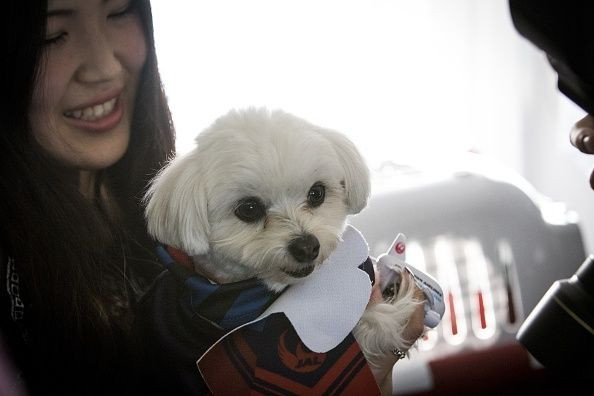Dead Dog Treated As 'Lost Luggage' By Chinese Airline, Owner Offered Money As Compensation

A Chinese airline allegedly tried to treat a dead dog as lost luggage by offering its owner monetary compensation per pounds the animal weighed, according to China’s Xinhua News Agency Tuesday.
The dog, a 3-year-old golden retriever named Doudou, died last Sunday. It was traveling on a China Eastern Airlines flight from Shenzhen to Wuhan. Its owner, a woman identified by her last name, Zuo, was using a pet transportation agency for the flight.
Read: Despite Airline Incidents, Travel By Plane Set To Break Records For Summer 2017
When the plane landed, Doudou was dead. The airline offered to compensate Zuo utilizing the same policy they uphold for damaged or lost cargo: 100 yuan per kilogram ($7.50 per pound), according to The Cover. The woman refused the offer. According to Xinhua, Dogeer offered Zuo 5,000 yuan ($735) in compensation, another offer she refused.
“I told the agent to take extra care with Doudou because I had heard of cases of animals dying during flight,” Zuo said to Xinhua.
Chinese Eastern Airlines was the company that the pet transportation agency, Dogeer, chose for transportation. When Zuo’s father went to pick up the dog, he sent Zuo photos showing the bars of the cage were bent and covered with bite marks. The airline treats live animals as freight and places them in the cargo hold, rather than in the cabin with passengers.
“China Eastern treated Doudou like a regular piece of luggage — these kinds of compensation standards are unacceptable from an emotional point of view,” Zuo told The Cover.
Doudou’s cause of death is unknown. The airline transported Doudou and another dog together in the pressurized cargo space. Upon arriving in Wuhan, the other dog appeared to be healthy, said a spokesman for China Eastern Airlines to Xinhua.
“I never wanted any huge kind of compensation,” Zuo said on Weibo, a Chinese microblogging website similar to Twitter.
“I just want airlines to pay attention, and not let it happen multiple times, and push responsibilities onto others,” she wrote, according to the Hong Kong Free Press (HKFP).
This incident happened only weeks after China Eastern Airlines was associated with another case of animal mistreatment allegedly carried out by Tianhe International Airport staff members.
A golden retriever who flew from Shanghai to Wuhan on a China Eastern Airlines flight sustained wounds while escaping from its cage in the plane’s freight cargo hold. It was returned to its owner by Tianhe International Airport staff, its owner wrote on Weibo. After the flight landed on May 24, the dog was named as missing. When the dog was returned to the owner, it was covered in blood and its eyes were bloodshot. Photos of the dog were included in the post.
“I was extremely angry and disappointed. This was like having my own child hit and having the aggressors shirk the responsibility,” the owner wrote in a post that was shared more than 130,000 times. “I wish China Eastern Airlines and Tianhe Airport would give me a reasonable explanation and stop shifting responsibility.”

Members of the online community responded by saying the airline should issue an official apology or award compensation.
Read: WATCH: United Airlines Plane At Newark Aiport Gushes Fuel As Jet Almost Takes Off
“In order to prevent the dog from running loose on airport runways or car parks, which could result in severe casualties, airport employees carried out restraining measures based on aviation laws and regulations,” Wuhan Tianhe International Airport said in a statement as reported by South China Morning Post.
China Eastern Airlines, however, has partnered up with Dogeer to try and determine Doudou's cause of death. However, the airline will not be taking responsibility for the incident because of a form releasing the airline from any liability, according to Xinhua.
China Eastern Airlines did not immediately return International Business Times' request for comment.
© Copyright IBTimes 2025. All rights reserved.





















